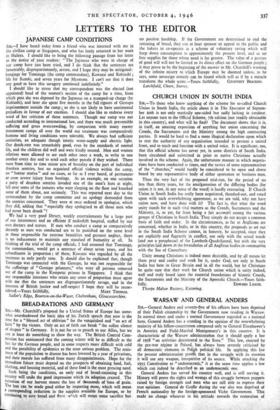CHURCH UNION IN SOUTH INDIA
SIR,—To those who know anything of the scheme for so-called Church Union in South India, the article about it in The Spectator of Septem- ber zoth is not only markedly one-sided but sadly lacking in candour. Let anyone turn to the Official Scheme, 7th edition (not readily obtainable in this country), and what will he find? The document shows that it is, in itself, an amazing exposition of anything but union concerning the Creeds, the Sacraments and the Ministry among the high contracting parties. It would be hard to find a more illogical declaration upon which to rest the authority of any organisation intended to present a united front, and to teach and function with a united voice. It is significant, too, that this official scheme has never yet, in some districts of South India, been circulated and submitted in print to native Christians actually involved in the scheme. Again, the unfortunate manner in which negotia- tions have been conducted at times, and the tactics of some representatives of the " churches," would hardly be considered to be open and above board by any representative body of either sportsmen or business men.
Then the very fact of the proposed trial-run, for the period of no less than thirty years, for the amalgamation of the differing bodies (for union it is not, in any sense of the word) is hardly reassuring. If Church Union in South India has really been negotiated, thrashed-out, and voted upon with such overwhelming agreement, as we are told, why not have union now, and have done with it? The fact is, that what the word unity stands for in such vital matters as the Creeds, Sacraments and the Ministry, is, as yet, far from being a fait accompli among the various groups of Christians in South India. They simply do not accept a common basis of faith and order. In the circumstances, as far as Anglicans are concerned, whether in India, or in this country, the proposals as set out in the South India Scheme cannot, in honesty, be accepted, since they are explicitly and flagrantly in conflict, not only with the actual words (and not a paraphrase) of the Lambeth-Quadrilateral, but with the very princip!es laid down in the formularies of all Anglican bodies in communion with the See of Canterbury.
Unity among Christians is indeed most desirable, and by all means let them pray and confer and work for it, under God, not only in South India but here in Great Britain and in all the world, but let Christians be quite sure that they work for Church union which is unity indeed, well and truly based upon the essential foundations of historic Creeds, the Sacraments and the Ministry of the Apostolic Church.—Yours faith- fully, EDWARD LEACH. Thorpe Malsor Rectory, Kettering.






























 Previous page
Previous page